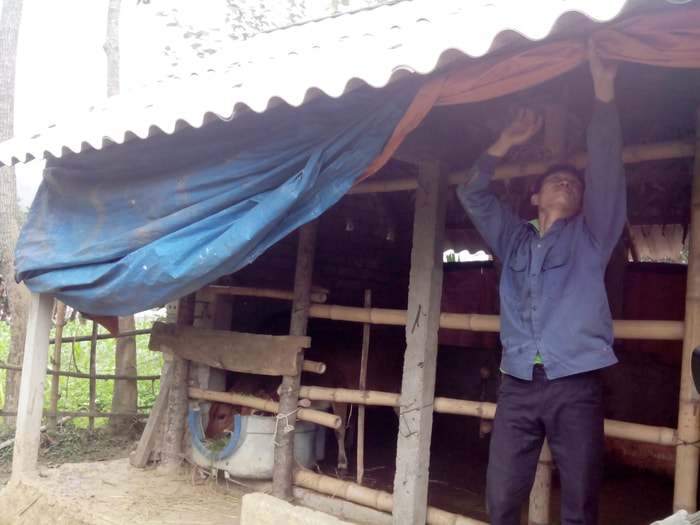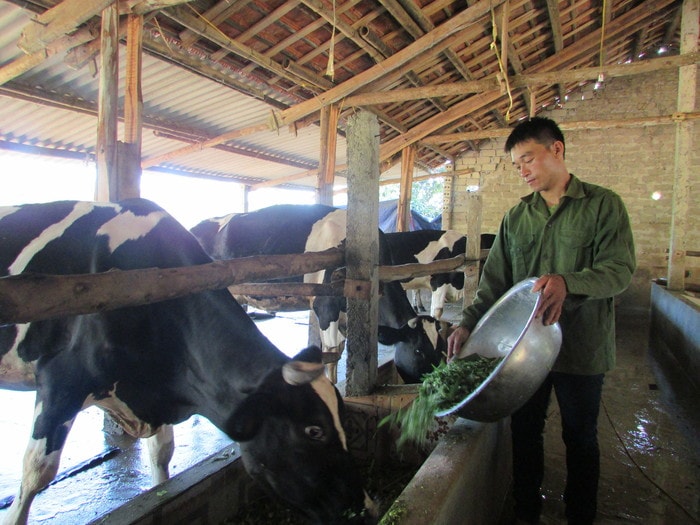How to take care of livestock and poultry during the rainy season
(Baonghean.vn) - Rain and storms are unfavorable factors that greatly affect the health of livestock and poultry; at the same time, heavy rains can cause localized flooding or widespread flooding, creating opportunities for disease to spread. To protect and prevent diseases for livestock and poultry during the rainy and stormy season, farmers need to do the following tasks well:
Grasp weather developments, proactively plan
Pay attention to weather information on the media every day to proactively apply technical measures to upgrade and cover barns.
Develop a plan to prepare food and water for animals, including measures to evacuate the herd when necessary.
Sessions should be held early in the morning, noon and evening to proactively take measures during the day and prepare for the next day.
 |
Check, upgrade and renovate animal pens
- The location of the barn should be high, well-drained, away from other barns, and far from densely populated areas to limit the risk of disease transmission to humans and vice versa. The barn should be built far from flash flood areas.
- The barn must be sturdy, leak-proof, flood-proof, and have a rain and wind cover to protect livestock and poultry during heavy rain and strong winds; suitable for the quantity, characteristics, and age of livestock and poultry. In low-lying areas, the barn floor must be raised to avoid flooding. There must be enough tarpaulin to cover the rain.
- Check the general drainage system of the whole area, especially strengthen the wastewater drainage system and waste storage area to limit pollution during heavy rain or flooding.
- Ensure isolation between the barn and the living area or between barns. There should be a disinfection pit in front of the barn door.
- The waste storage area (manure, garbage and wastewater) must be far from the barn, downwind, low and far from underground water sources, schools, hospitals, etc.
Special care
- Enhance care and nutrition for livestock and poultry to increase health, help livestock and poultry have the ability to resist adverse impacts, and limit the outbreak of diseases. Implement good care and nutrition techniques, suitable for the breed, age and production purpose of each type of livestock and poultry.
- Ensure food sources: grass is the main food source for grazing livestock. During storms, grass is easily flooded and falls, so it is necessary to proactively reserve green food sources, which can be dried (straw and grass), silage grass or tree trunks to ensure food sources for livestock during the storm season. In particular, it is necessary to pay attention to providing additional concentrated feed for grazing livestock so that they have the necessary nutrients to help them cope with adverse weather conditions.
- During rainy and stormy days, it is necessary to preserve concentrated feed well because the humid weather and heavy rains can easily cause mold in concentrated feed; therefore, the concentrated feed storage area must be checked regularly every day. When feeding livestock and poultry, pay close attention to checking carefully. If you detect moldy feed or food that has an unusual smell, you must remove it immediately and absolutely do not feed it to animals.
- For pregnant animals, nursing animals and dairy cows, it is necessary to supplement their food with minerals, vitamins and electrolytes to improve their resistance.
 |
Disease prevention for livestock and poultry
- Strengthen disease prevention and hygiene for livestock and poultry: regularly clean and sanitize inside and outside the barn; periodically clean feeding troughs, drinking troughs, and livestock equipment; spray disinfectant inside and outside the barn to kill pathogens in the environment. Prepare a reserve of some essential veterinary medicines such as stimulants, broad-spectrum antibiotics, disinfectants, etc.
- Ensure food and drinking water hygiene. Chloramine-B, Clorin, etc. can be used to disinfect water in places where water sources are polluted, ensuring adequate clean water supply for livestock.
- Actively prevent diseases with vaccines: fully vaccinate against common diseases in livestock such as septicemia for buffaloes and cows; swine fever, septicemia, paratyphoid, foot-and-mouth disease, blue ear disease for pigs; avian influenza, Newcastle, Gumboro, septicemia for chickens; avian influenza, duck cholera, septicemia for ducks and geese.
- Supplement vitamins, stimulants, digestive enzymes for livestock and poultry during adverse weather.
- Regularly check the health of livestock and poultry, especially easily detect abnormalities in the early morning through:
+ Listen to detect unusual sounds or the absence of everyday sounds.
+ Observe the state of the animal to detect abnormalities such as lethargy, depression or aggression; check the state of feces and urine; and check the daily food and water intake of livestock and poultry.
+ Detecting unusual odors or poor ventilation… helps to know the health status of livestock and poultry.
- Isolate animals showing unusual symptoms promptly, diagnose and treat if necessary, do not sell or spread sick or dead livestock and poultry and their waste around, to avoid spreading disease.
How to handle when livestock and poultry get wet in the rain
- When livestock and poultry are splashed by rain or leaks... soaked in water or wet for a long time, it will cause loss of heat, reduce resistance and easily cause disease, so it is necessary to immediately put wet livestock and poultry in a dry and warm barn.
- Replace or supplement dry bedding for livestock. Enhance care and nutrition, supplement vitamins, minerals, and digestive enzymes for livestock. For livestock showing signs of digestive disorders or respiratory diseases, they must be isolated and treated promptly.
- After storms and floods, when the water recedes, it is necessary to clean and sanitize barns, pastures, collect waste... and spray disinfectants to kill pathogens in the barn floor and pastures.
Ngoc Anh
(Synthetic)
| RELATED NEWS |
|---|
